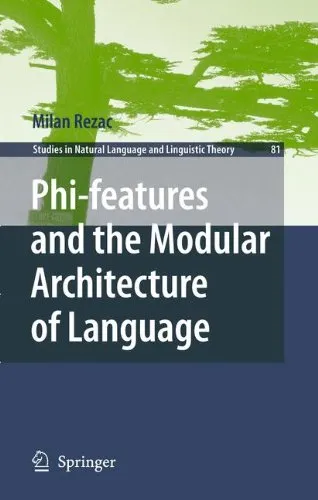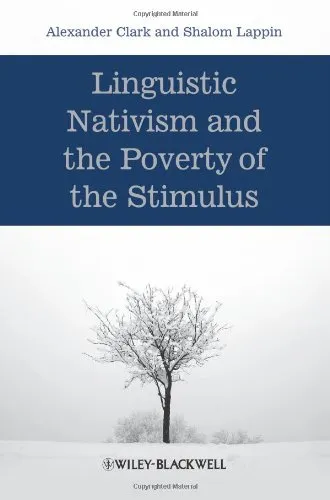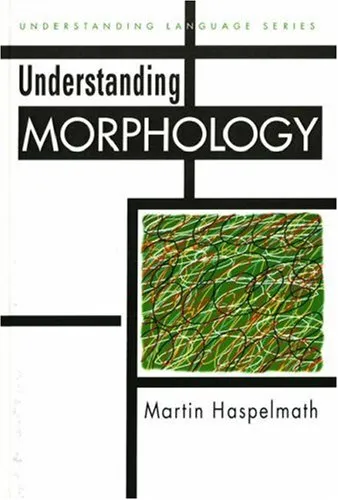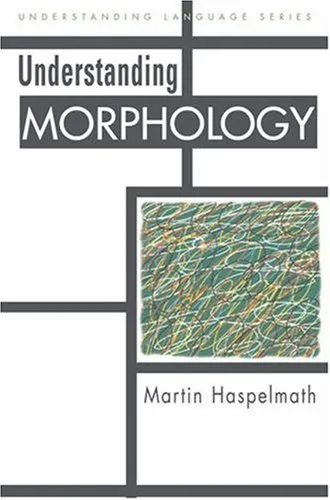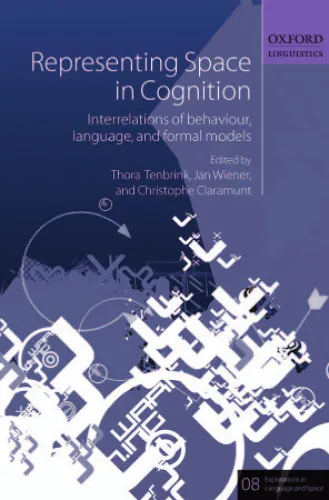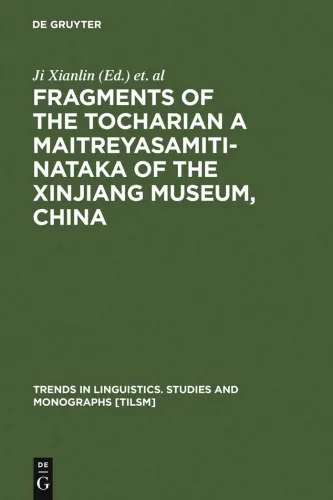Phi-Features and the Modular Architecture of Language
4.0
بر اساس نظر کاربران

شما میتونید سوالاتتون در باره کتاب رو از هوش مصنوعیش بعد از ورود بپرسید
هر دانلود یا پرسش از هوش مصنوعی 2 امتیاز لازم دارد، برای بدست آوردن امتیاز رایگان، به صفحه ی راهنمای امتیازات سر بزنید و یک سری کار ارزشمند انجام بدینکتاب های مرتبط:
معرفی کتاب "Phi-Features and the Modular Architecture of Language"
کتاب "Phi-Features and the Modular Architecture of Language" نوشته 'Milan Rezac' به بررسی نقش و اهمیت ویژگیهای phi در معماری مدولار زبان میپردازد. این کتاب به طور جامعی رابطه بین syntax، morphology و semantics را تحلیل میکند و نشان میدهد که چگونه ویژگیهای phi در درک بهتر سازوکار زبان نقش کلیدی دارند.
خلاصه جامع کتاب
کتاب به صورت گسترده ویژگیهای phi، شامل person، number و gender را مورد بحث قرار میدهد. این ویژگیها واحدهای بنیادی در دستور زبان انسان به شمار میروند و وظیفه ایجاد ساختارهای گرامری صحیح را به عهده دارند. 'Milan Rezac' در این اثر تلاش میکند تا نشان دهد که چگونه ویژگیهای phi از طریق تعامل در سیستمهای مختلف زبانی (مانند syntax و morphology) اجرا و هماهنگ میشوند.
در بخشهای مختلف این کتاب، معماری مدولار زبان به عنوان چارچوبی برای مطالعه این ویژگیها معرفی شده است. این چارچوب نشان میدهد که چگونه هر مدول (مانند syntax یا phonology) به طور مستقل عمل میکند و در عین حال با دیگر مدولها تعامل دارد تا معنا و ساختار منسجم در زبان تولید شود. تحلیلهای ارائه شده در این کتاب به وضوح نشان میدهند که برخی از پدیدههای زبانی مانند agreement، coordination و ellipsis از طریق انتقال و پردازش اطلاعات phi قابل توضیح هستند.
مهمترین نکات کلیدی
- بررسی نقش ویژگیهای phi در syntax و معناشناسی.
- توضیح معماری مدولار زبان و تعامل سیستمهای مختلف زبانی.
- مطالعه پدیدههایی مثل agreement و نقش اطلاعات phi در کنترل آنها.
- ارتباط بین ویژگیهای phi و ساختارهای زبانی پیچیده مانند ellipsis و coordination.
- تحلیل دقیق سازوکارهای morphosyntactic و چرایی اهمیت آنها در زبانشناسی نظری.
نقلقولهای معروف از کتاب
"The phi-features are not just surface phenomena—they are deep principles that structure the human capacity for language."
"Modularity in language allows us to understand not only the separation of linguistic systems but also their profound interactions."
"Agreement systems are the interface where phi-features unfold their intricate architecture."
چرا این کتاب مهم است؟
این کتاب برای زبانشناسان نظری و محققان حوزه روانشناسی زبان بسیار ارزشمند است، چراکه به سوالات بنیادین در زمینه چگونگی عملکرد زبان پاسخ میدهد. درک ویژگیهای phi نه تنها برای تحلیل دستور زبان مهم است بلکه به ما دیدگاهی درباره نحوه تعامل بخشهای مختلف ذهن انسان در تولید و فهم زبان میدهد.
همچنین، این کتاب منبعی کلیدی برای دانشجویان و پژوهشگران زبانشناسی است که به دنبال چارچوبی منسجم برای تحلیل مسائل پیچیده زبانی هستند. 'Milan Rezac' با تحلیلهای دقیق و استفاده از دادههای زبانی متنوع از زبانهای مختلف، این اثر را به یکی از منابع مرجع در مطالعه معماری زبان تبدیل کرده است.
Introduction to 'Phi-Features and the Modular Architecture of Language'
"Phi-Features and the Modular Architecture of Language" is a groundbreaking exploration of one of the most intricate and fascinating aspects of language: the nature and role of phi-features. The book delves deeply into how these linguistic features—such as person, number, gender, and case—interact with the modular structure of grammar, shedding light on critical questions related to syntax, morphology, and semantics. With a fine balance of theoretical depth and empirical analysis, this work is an invaluable resource for linguists and language enthusiasts seeking to better understand the underpinnings of human language.
Detailed Summary of the Book
The book embarks on an intellectual journey into the domain of phi-features, a cornerstone in linguistic theory that governs the agreement between subjects, verbs, pronouns, and other syntactic elements. Phi-features are unique in that they encapsulate universal properties of language while also varying across linguistic systems. By exploring these features, the book addresses fundamental questions about how linguistic knowledge is structured and shared.
The discussion begins with an examination of the modular nature of language. Modular thinking in linguistics posits that certain components of the grammar operate independently yet interact in constrained ways. The book investigates how phi-features relate to these components, providing a framework that connects syntax, morphology, semantics, and phonology. Specifically, it considers how phi-features trigger agreement rules, govern pronominal binding, and even affect crosslinguistic variation.
Through formal analyses and empirical evidence drawn from typologically diverse languages, the book demonstrates how phi-features are central to understanding dependencies in grammar. Additionally, it connects the dots between theoretical linguistics and psycholinguistics, suggesting that phi-features operate not just as abstract constructs but as cognitive representations within the human mind.
Key Takeaways
- Understanding Phi-Features: The book offers an intensive look into the nature of person, number, gender, and case features, uncovering their fundamental properties and behavior in grammar.
- Modular Architecture of Language: A compelling argument is presented for the modular design of the grammar, with phi-features serving as a bridge across syntax, morphology, and semantics.
- Cross-Linguistic Perspectives: Drawing from data across diverse languages, this study highlights the variability and universality of phi-features in human language systems.
- Cognitive and Theoretical Impacts: The treatment of phi-features reveals their importance in both abstract linguistic theory and psycholinguistic processing.
- Breadth of Inquiry: The text addresses phenomena such as agreement mismatches, feature impoverishments, and hierarchical structures within and across languages.
Famous Quotes from the Book
"At the heart of the modular grammar lies the interplay of phi-features, encapsulating universality with flexible granularity."
"To study phi-features is to understand the grammar’s essence—a system delicately balanced between order and variability."
"The modular architecture of language offers a glimpse into the mind’s innate linguistic organization through the lens of agreement and structure."
Why This Book Matters
The significance of "Phi-Features and the Modular Architecture of Language" lies in its multifaceted approach to a central element of linguistic theory. By situating phi-features in the broader context of modular grammar, the book advances our understanding of how language is structured and processed. It bridges the gap between theoretical principles and empirical data, making it a vital resource for researchers examining crosslinguistic variation and the cognitive underpinnings of grammar.
Moreover, the book enriches debates in contemporary linguistics by tackling long-standing challenges, such as agreement mismatches and feature realizations. Its insights contribute not only to the field of syntax but also to morphology, semantics, and psycholinguistics, making it a must-read for anyone interested in the intricacies of human language. Whether you are a seasoned linguist, an academic researcher, or simply a curious reader eager to delve into the fundamentals of grammar, this book offers a compelling and enlightening perspective.
دانلود رایگان مستقیم
شما میتونید سوالاتتون در باره کتاب رو از هوش مصنوعیش بعد از ورود بپرسید
دسترسی به کتابها از طریق پلتفرمهای قانونی و کتابخانههای عمومی نه تنها از حقوق نویسندگان و ناشران حمایت میکند، بلکه به پایداری فرهنگ کتابخوانی نیز کمک میرساند. پیش از دانلود، لحظهای به بررسی این گزینهها فکر کنید.
این کتاب رو در پلتفرم های دیگه ببینید
WorldCat به شما کمک میکنه تا کتاب ها رو در کتابخانه های سراسر دنیا پیدا کنید
امتیازها، نظرات تخصصی و صحبت ها درباره کتاب را در Goodreads ببینید
کتابهای کمیاب یا دست دوم را در AbeBooks پیدا کنید و بخرید
1411
بازدید4.0
امتیاز0
نظر98%
رضایتنظرات:
4.0
بر اساس 0 نظر کاربران
Questions & Answers
Ask questions about this book or help others by answering
No questions yet. Be the first to ask!
